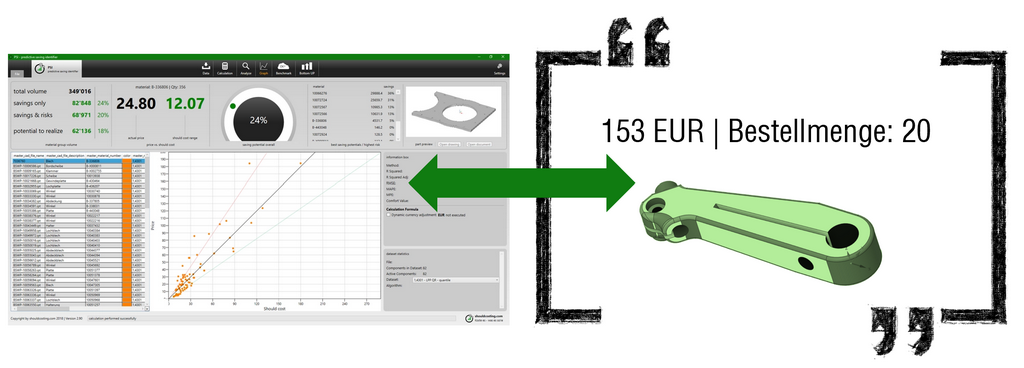Products | PSI - predictive saving identifier
AI-DRIVEN | Identify 12-15% Potential Savings
Identify potential savings in mass data from 12-15% of your purchase volume. Find similar items within seconds, automate the pooling of items, calculate scenarios and automate the selection of suppliers. The "PSI - predictive saving identifier" is your entry into procurement excellence with AI.
PSI | The Control Center for Mass Data with ERP Connector
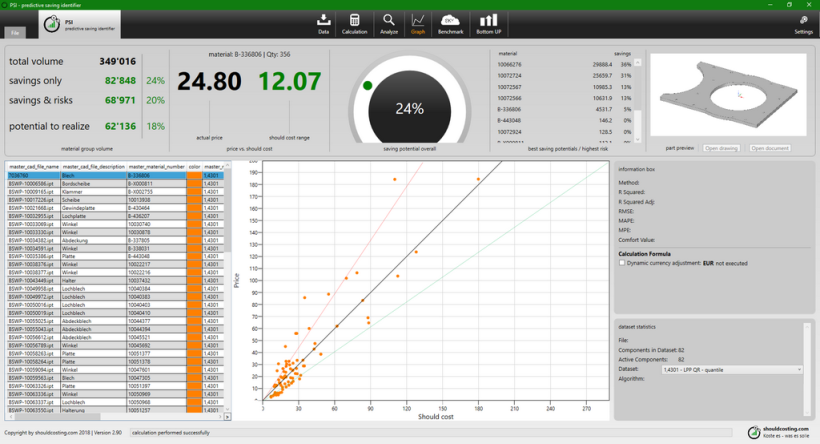
The PSI identifies potential savings, finds similar or identical components within seconds, calculates prices of new components and also masters the caclulation of CO2 carbon footprint in mass data. The PSI answers questions, that arise daily in procurement and represents Advanced Procurement at the highest level. However, the PSI can do much more than non linear performance pricing. With PSI's state-of-the-art algorithms, our customers calculate the perfect target price formulas and use these formulas directly in the CostChecker 3D CAD module (Model-Based Cost Engineering).
Modules within the PSI - predictive saving identifier

Fully equipped, the PSI is the Swiss Army Knife for procurement excellence. These modules are available for the PSI - predictive saving identifier. Click on the respective option to learn more about the range of functions.
-
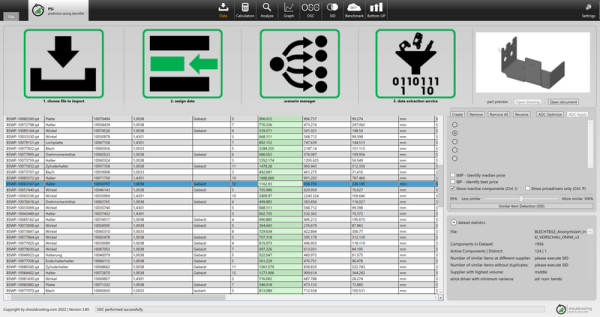
AAS - automatic algorithm search
With "AAS - automatic algorithm search", the PSI finds the best and most accurate calculation method for the input data - fully automated. What additionally distinguishes the PSI - predictive saving identifier: High mathematics - easy to use. The PSI provides new, fact-based arguments for renegotiations with suppliers and can be fully integrated into existing IT Infrastructures (ERP, PLM, PDM).
-
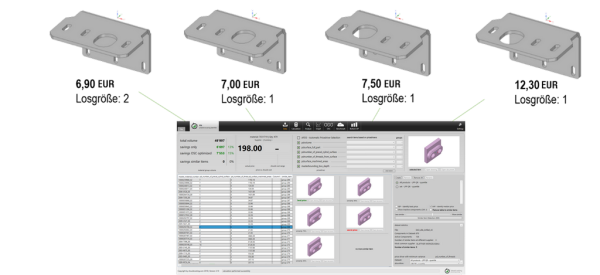
SID - similar item detection
For companies it is impotant to find their way through large databases, in order to avoid redundancies and increase the reuse of items. With SID - similar item detection our cutomers are able to find similar components or assemblies within seconds. But in some cases, no 3D geometry, no 3D CAD file is available. With SID you can even find similar items based only on 2D drawings.
-
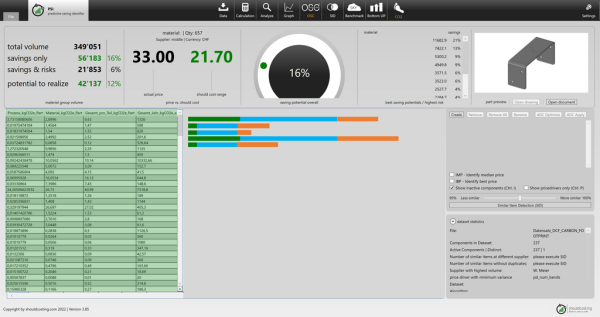
DCF - Data-Driven Carbon Footprint
Efficient analysis methods are needed, to determine the carbon emissions of products. However, the reduction of emissions along the value chains requires a high level of detail of the process chains. This knowledge is often missing at the beginning of carbon projects. For this reason, we distinguish between two approaches to map the carbon emissions of products:
-
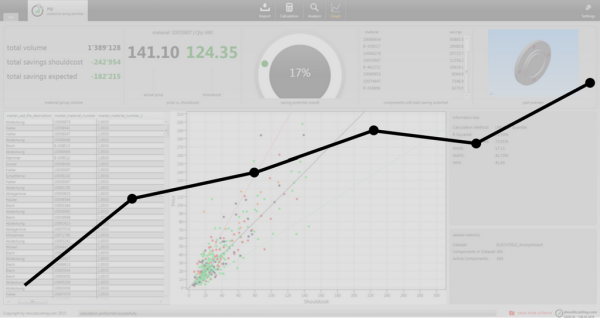
DMA - dynamic materialprice adjustment
Prices of raw material will continue to be under constant observation in 2022. A slowdown in price increases is expected for 2022. However, the situation remains difficult and suppliers will continuously adjust prices. To ensure full transparency in this situation, the PSI includes the function "DMA - dynamic materialprice adjustment". For this purpose, PSI has stored the raw material prices of many materials over many years. This means that it is known at any time whether the suppliers' price demands are justified. With just one mouse click.
-
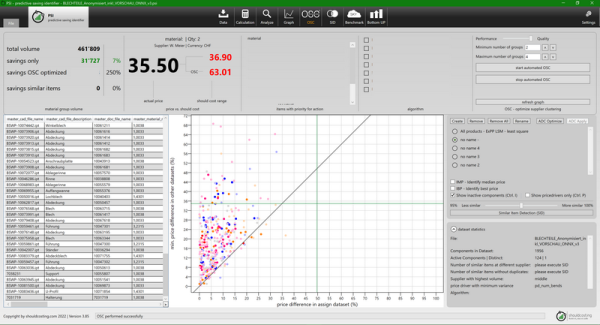
OSC - optimize supplier clustering
OSC - optimize supplier clustering, supports the procurement departments in supplier management. Intelligent algorithms allocate articles optimally to suppliers - based on criteria to be specifically defined. The PSI - predictive saving identifier knows, based on the integrated data models, which suppliers are the right suppliers for the items - from a technical and commercial perspective. For existing items, but also for new components or assemblies. It has never been easier to identify the most suitable suppliers for your items.
-
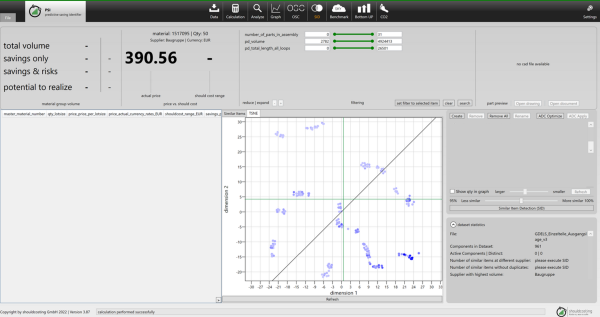
TSNE - T-Distributed Stochastic Neighbor Embedding
TSNE is the perfect solution to identify unlogical price structures in thousends of items.
-
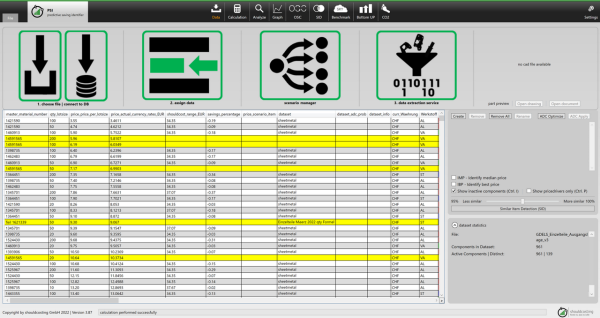
DCC - Data-Driven Connector to ERP Systems
With the DDC - Data-Driven Connector Module, the PSI integrates perfect to your ERP and PLM- Systems and deliver answers, directly where they are needed.
-
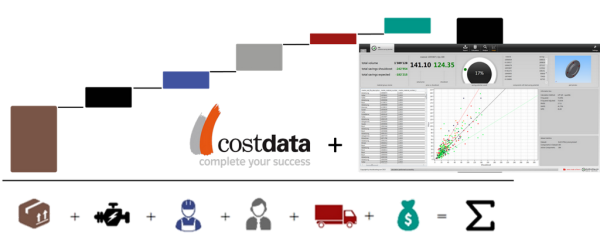
HCC - hybrid cost calculation (Bottom-UP integriert)
With AEPC - automated enterprise product costing, a high amount of components can be calculated fully automatically. For certain items, it makes more sense to use a classic Bottom-UP costing process. The PSI offers all possibilities for this. The integrated Bottom-UP costing of costdata® is therefore fully integrated. The costdata® software, integrated in the PSI - predictive saving identifier, enable extensive Bottom-UP calculations and detailed cost-breakdowns. We rely on costdata® when Bottom-UP calculations are needed.

With the PSI, our customers create parametric cost models from any data within seconds. The created models can be used directly in the procurement or engineering department - in the Award-Winning software CostChecker.
Model-Based Cost Engineering | Create and deploy parametric cost models within the PSI


Price inquiries at suppliers cause high costs. The requests often take a lot of time and the lead times of projects are unnecessarily increased.Our customers substantially reduce supplier inquiries with the PSI - predictive saving identifier and the possibility, for Model-Based RFQ. Our customers know prices, before suppliers do!
Model-Based RFQ | Reduce price inquiries at suppliers
